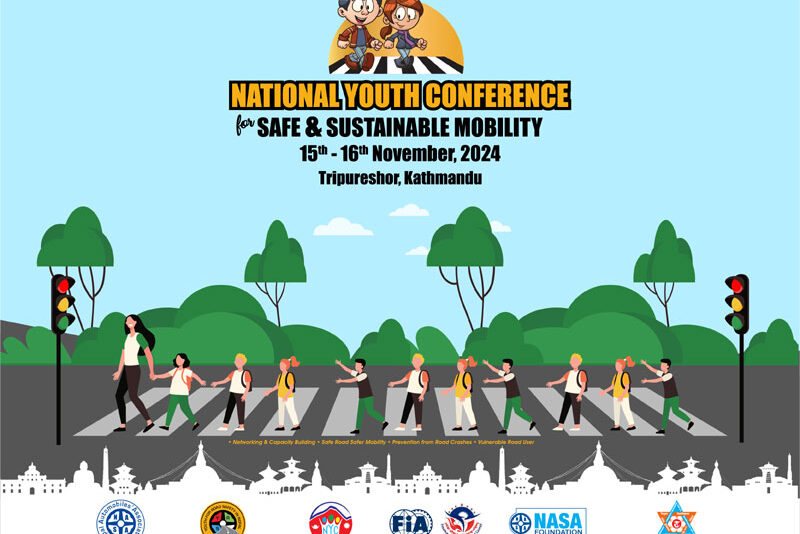
Kathmandu – Preparations are underway for the National Youth Conference on Safe and Sustainable Mobility, organized by the Nepal Automobile Association (NASA Nepal), which has been active in motorsports, automobile mobility, tourism, and road safety for the past fifteen years. This conference aims to discuss sustainable roads and safe transport, managed by the national youth network “Youth for Road Safety in Nepal.”
The conference will take place in Kathmandu on November 16 and 17 and is coordinated by NASA Nepal with the support of the International Automobile Federation (FIA), in collaboration with the National Youth Council and NASA Foundation Nepal. The Ministry of Labor, Employment, and Transport of Bagmati Province and Tribhuvan University are also key partners for this event.
The conference will see participation from youth across various provinces and will include experts, road safety specialists, and officials from relevant organizations. The event aims to address the alarming rise in road accidents and the associated human, economic, and physical costs. NASA Nepal has highlighted the importance of youth engagement in the improvement and development of road safety and transportation policies.
The program will feature presentations on relevant topics, discussion sessions, workshops, and presentations of research reports. Special sessions will cover youth and social media, motorcycling safety, and youth entrepreneurship. The conference will culminate with the issuance of the Kathmandu Declaration 2024, which will encompass discussions on road safety, youth participation, and a question-and-answer session with experts from various fields.
This national conference, a first of its kind in Nepal, is expected to draw significant contributions from international speakers as well as representatives from Tribhuvan University, the Bagmati Province Federation, and the National Youth Council. In a country with inadequate infrastructure and weak public transport systems, unsafe roads are a leading cause of premature death among the youth and general public.
The conference will include critical sessions covering topics such as:
1. Capacity building and network expansion for youth.
2. Mobilization of youth for sustainable roads and safe transportation.
3. Prevention of road accident-related injuries to youth and children.
4. Addressing issues faced by cyclists, pedestrians, and high-risk road users.
5. Presentations by experts.
6. Dialogue on youth, policies, and road safety.
7. Provincial-level youth conferences.
Globally, youth have been actively organized in favor of sustainable roads and safe transport, collaborating with various professional associations. Most governments, businesses, academia, and NGOs have been cooperating in this field for a long time. The involvement of youth organizations is expected to further ease the establishment of this agenda.
Youth for Road Safety Nepal, which was initiated in 2012 by then AIA President and current UN Special Envoy for Road Safety, Jean Todt, is now organizing a national youth campaign, restructured and organized for this purpose. This network is a member of international campaigns like Youth for Road Safety and Global Youth Coalition for Road Safety, and is also a youth organization of NASA Nepal. The event will see participation from youth in engineering, automobiles, education, and sports, as well as social activists and local representatives.
The conference will feature organized representation from ten clusters in Nepal: Dang, Butwal, Chitwan, Nuwakot, Simra, Dolakha, Katalari, Kavre, Kathmandu, and Dhangadhi, preparing and presenting various programs planned for these areas.
The World Health Organization, acting as the secretariat for the global campaign, along with UNDP and UNICEF, is also actively involved in road safety initiatives. Although the Ministry of Physical Infrastructure and Transport is the responsible authority, the Ministries of Health and Population and Home Affairs are also significantly active.
Despite governmental efforts, community engagement, and strong media support, road accidents in Nepal have become increasingly severe. Reactive measures alone cannot effectively prevent these incidents. The Nepalese government has failed to implement crucial strategic and managerial actions like amending the Road Safety Act, establishing a Road Safety Council, and conducting road safety audits, with mere public awareness and reactive measures yielding little results. The conference aims to urge stakeholders to push the government towards necessary action.
The entry of the National Youth Council into this agenda marks an important new beginning, as it is essential to dispel the notion that youth participation is limited to politics. Similarly, the involvement of Tribhuvan University could become a cornerstone for reforms, as this area has seen insufficient research and study.
Nepal has shown no signs of improvement in accordance with its commitments made during the UN-declared Decade of Action for Road Safety from 2011-2020. Additionally, there have been no efforts for reform following the 2020 re-declaration of the agenda for 2021-2030.
In this context, a ministerial-level conference will be held in February 2025, coinciding with a mid-term review of the decade. A report will also be presented at the upcoming World Youth Conference in Morocco.
The first National Youth Conference will be inaugurated by the Minister of Youth and Sports at the World Trade Center in Kathmandu at the end of November, and will conclude with remarks from the Minister of Physical Infrastructure and Transport, according to NASA Nepal.
FACEBOOK COMMENTS